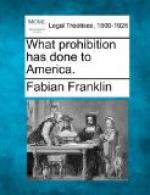And is there not abundant evidence that the whole
of this Maryland story is typical of what has been
going on throughout the country? Charges are made
that the Anti-Saloon League has expended vast sums
of money in its campaigns; money largely supplied,
it is often alleged, by one of the world’s richest
men, running into the tens of millions or higher. r
do not believe that these charges are true. More
weight is to be attached to another factor in the
case—the adoption of the Amendment by Congress
while we were in the midst of the excitement and exaltation
of the war, and two million of our young men were
overseas. Unquestionably, advantage was taken
of this situation, there can be little doubt that
the Eighteenth Amendment would have had much harder
sledding at a normal time. And it is right, accordingly,
to insist that the Amendment was not subjected to
the kind of discussion, nor put through the kind of
test of national approval, which ought to precede any
such permanent and radical change in our Constitutional
organization. This is especially true because
National Prohibition was not even remotely an issue
in the preceding election, nor in any earlier one.
All these things must weigh in our judgment of the
moral weight to be attached to the adoption of the
Eighteenth Amendment; but there is another aspect
of that adoption which is more important. The
gravest reproach which attaches to that unfortunate
act, the one which causes deepest concern among thinking
citizens, does not relate to any incidental feature
of the Prohibition manoevres. The fundamental
trouble lay in a deplorable absence of any general
understanding of the seriousness of making a vital
change in the Constitution—incomparably
the most vital to which it has ever been subjected—and
of the solemn responsibility of those upon whom rested
the decision to make or not to make that change.
Even in newspapers in which one would expect, as a
matter of course, that this aspect of the question
would be earnestly impressed upon their readers, it
was, as a rule, passed over without so much as a mention.
And this is not all. One of the shrewdest and
most successful of the devices which the League and
its supporters constantly made use of was to represent
the function of Congress as being merely that of submitting
the question to the State Legislatures; as though
the passage of the Amendment by a two-thirds vote
of Congress did not necessarily imply approval, but
only a willingness to let the sentiment of the several
States decide. Of course, such a view is preposterous;
of course, if such were the purpose of the Constitutional
procedure there would be no requirement of a two-thirds
vote.* But many members of Congress were glad enough
to take refuge behind this view of their duty, absurd
though it was; and no one can say how large a part
it played in securing the requisite two-thirds of
House and Senate. Yet from the moment the Amendment
was thus adopted by Congress, nothing more was heard




